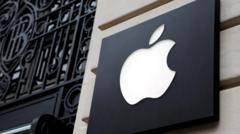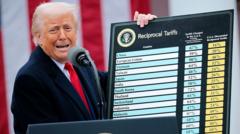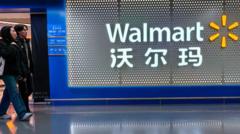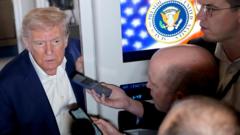In a revealing fusion of technology and geopolitical conflict, your smartphone may contain tantalum—a rare, critical metal extracted from war-ridden areas in the Democratic Republic of Congo (DRC). This blue-grey metal, essential for electronic devices, is primarily sourced from regions currently held by the M23 rebel group, stirring concerns over human rights violations and conflict financing.
### Your Smartphone’s Hidden Link to Conflict in the DRC

### Your Smartphone’s Hidden Link to Conflict in the DRC
The untold story of tantalum sourcing from war-torn regions is exposing connections between tech and conflict.
Tantalum’s unique qualities make it a key component in various electronics, yet its extraction often comes at a dire cost. Approximately 40% of the world’s tantalum supply emerges from the DRC, with M23 controlling vital mining areas. Their recent military incursions, particularly in Goma, a key trading hub, have heightened tensions.
The complexities of mineral extraction in the DRC present a chaotic landscape, where thousands work under hazardous conditions. Following their takeover of Rubaya—central to comprizing the country’s coltan industry—the M23 established a quasi-government, imposing taxes on miners and traders. They’ve reportedly earned about $800,000 a month from coltan taxation alone, allegedly funding their military operations with these proceeds.
Despite smuggling and illegal clout in the mining sector, the flow of tantalum to the global market often remains obscure. Rwanda, accused of supporting the M23, plays a pivotal role in this tangled web, blurring the lines between conflict and commerce. Although initiatives such as the Innovative Tin Supply Chain Initiative (Itsci) aim to certify conflict-free minerals, criticisms persist due to issues with tracing the true origin of materials.
Rwanda’s government vehemently denies accusations of supporting armed groups and insists on its mineral refining capabilities. However, surging coltan export figures suggest that much of this might orbit around M23-controlled areas, raising ethical concerns for global tech companies.
In light of these revelations, the Congolese government has initiated legal action against tech giants like Apple for alleged complicity in employing conflict minerals. While Apple announced a cessation of sourcing tantalum from the DRC and Rwanda due to the escalating conflict, many other companies remain vague about their supply chains.
As the reach of the M23 expands, the conflict continues to intertwine with the technology industry, leaving consumers unaware of the real cost behind their handheld devices.
The complexities of mineral extraction in the DRC present a chaotic landscape, where thousands work under hazardous conditions. Following their takeover of Rubaya—central to comprizing the country’s coltan industry—the M23 established a quasi-government, imposing taxes on miners and traders. They’ve reportedly earned about $800,000 a month from coltan taxation alone, allegedly funding their military operations with these proceeds.
Despite smuggling and illegal clout in the mining sector, the flow of tantalum to the global market often remains obscure. Rwanda, accused of supporting the M23, plays a pivotal role in this tangled web, blurring the lines between conflict and commerce. Although initiatives such as the Innovative Tin Supply Chain Initiative (Itsci) aim to certify conflict-free minerals, criticisms persist due to issues with tracing the true origin of materials.
Rwanda’s government vehemently denies accusations of supporting armed groups and insists on its mineral refining capabilities. However, surging coltan export figures suggest that much of this might orbit around M23-controlled areas, raising ethical concerns for global tech companies.
In light of these revelations, the Congolese government has initiated legal action against tech giants like Apple for alleged complicity in employing conflict minerals. While Apple announced a cessation of sourcing tantalum from the DRC and Rwanda due to the escalating conflict, many other companies remain vague about their supply chains.
As the reach of the M23 expands, the conflict continues to intertwine with the technology industry, leaving consumers unaware of the real cost behind their handheld devices.


















